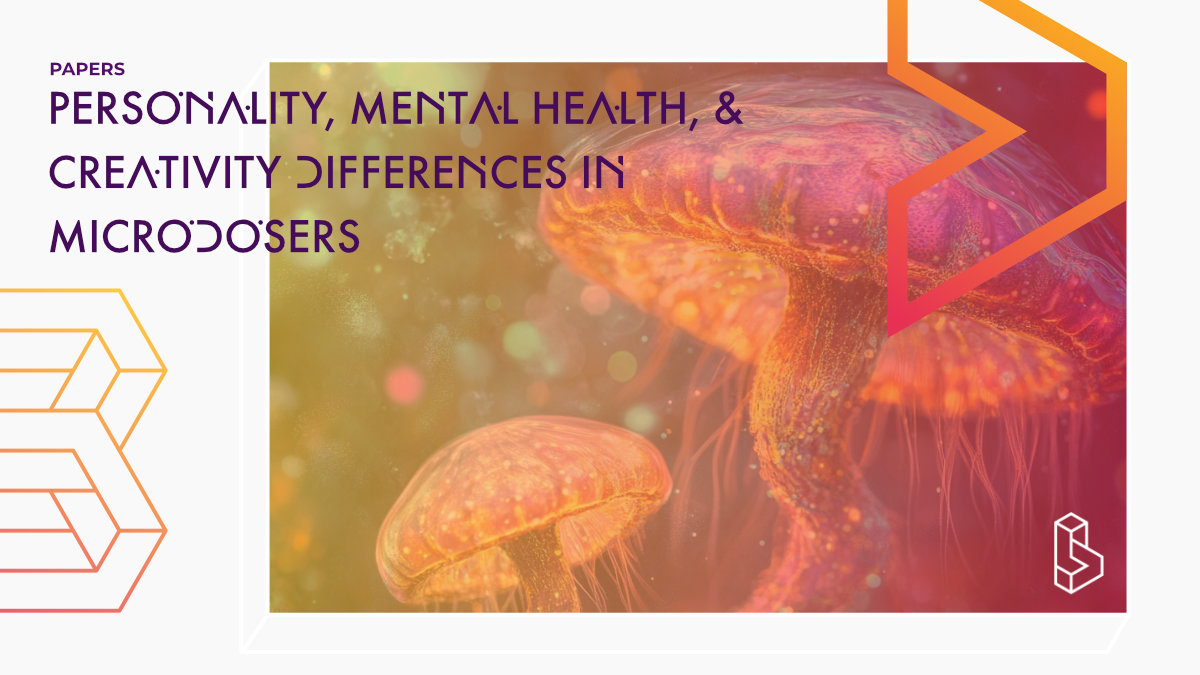This survey study (n=909, 65% of which microdosed) included the Unusual Uses Tasks as a proxy for divergent creativity. They found that people who microdosed psychedelics (mostly LSD (65%) and psilocybin (28%)) were more creative (p < 0.001, r = 0.15).
Abstract of Microdosing psychedelics: personality, mental health, and creativity differences in microdosers
“Rationale: Microdosing psychedelics—the regular consumption of small amounts of psychedelic substances such as LSD or psilocybin—is a growing trend in popular culture. Recent studies on full-dose psychedelic psychotherapy reveal promising benefits for mental well-being, especially for depression and end-of-life anxiety. While full-dose therapies include perception distorting properties, microdosing may provide complementary clinical benefits using lower-risk, non-hallucinogenic doses.
Objectives: This pre-registered study aimed to investigate whether microdosing psychedelics is related to differences in personality, mental health, and creativity. Methods In this observational study, respondents recruited from online forums self-reported their microdosing behaviors and completed questionnaires concerning dysfunctional attitudes, wisdom, negative emotionality, open-mindedness, and mood. Respondents also performed the Unusual Uses Task to assess their creativity.
Results: Current and former microdosers scored lower on measures of dysfunctional attitudes (p < 0.001, r = − 0.92) and negative emotionality (p = 0.009, r = − 0.85) and higher on wisdom (p < 0.001, r = 0.88), openmindedness (p = 0.027, r = 0.67), and creativity (p < 0.001, r = 0.15) when compared to non-microdosing controls.
Conclusions: These findings provide promising initial evidence that warrants controlled experimental research to directly test safety and clinical efficacy. As microdoses are easier to administer than full-doses, this new paradigm has the exciting potential to shape future psychedelic research.”
Authors: Thomas Anderson, Rotem Petranker, Daniel Rosenbaum, Cory R. Weissman, Le-Anh Dinh-Williams, Katrina Hui, Emma Hapke & Norman A. S. Farb
Summary of Microdosing psychedelics: personality, mental health, and creativity differences in microdosers
Microdosing psychedelics is a growing practice despite a lack of scientific research validating its effects. Members of the public are exposed to the risks implied by criminalized activity and lack of even minimal scientific evidence that normally surrounds clinical use.
We measured self-reported practices and psychological function of participants in existing microdosing communities to develop a description of the common practices used in microdosing.
Full-dose psychedelics
Find this paper
Microdosing psychedelics: personality, mental health, and creativity differences in microdosers
https://doi.org/10.1007/s00213-018-5106-2
Paywall | Google Scholar | Backup | 🕊
Cite this paper (APA)
Anderson, T., Petranker, R., Rosenbaum, D., Weissman, C. R., Dinh-Williams, L. A., Hui, K., ... & Farb, N. A. (2019). Microdosing psychedelics: personality, mental health, and creativity differences in microdosers. Psychopharmacology, 236, 731-740.
Study details
Compounds studied
LSD
Psilocybin
Topics studied
Microdosing
Creativity
Study characteristics
Survey
Participants
909
Humans
Institutes
Institutes associated with this publication
University of TorontoThe University of Toronto has established the Psychedelic Studies Research Program.

